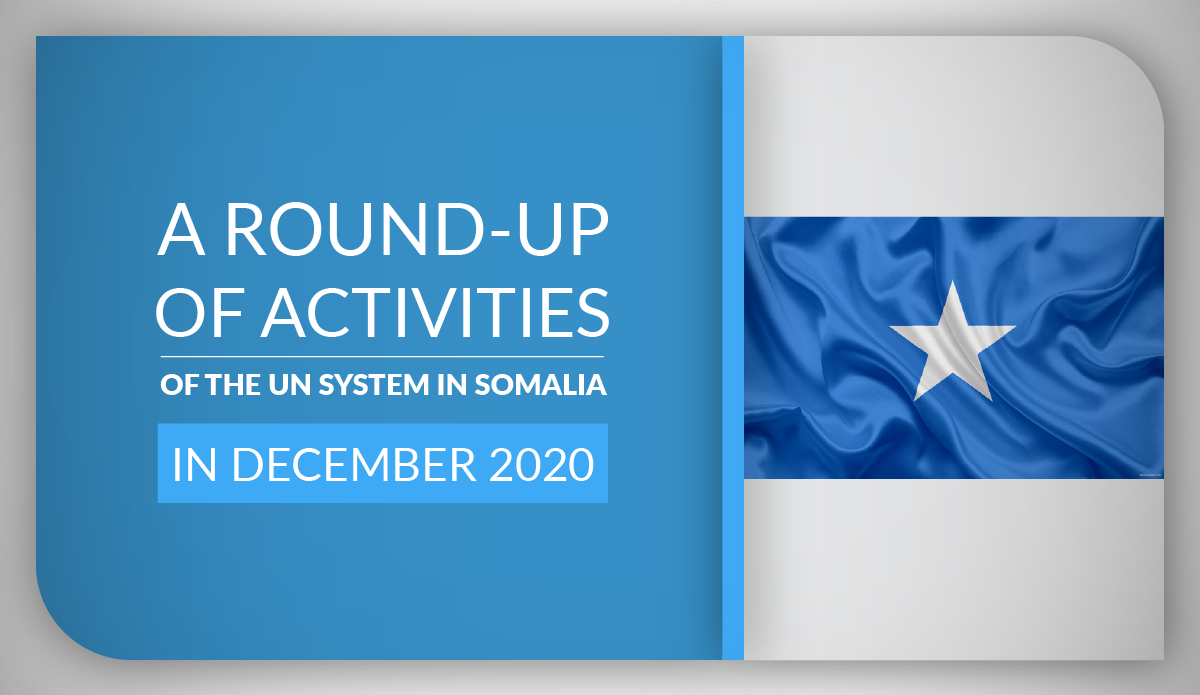A round-up of activities of the UN system in Somalia in December 2020
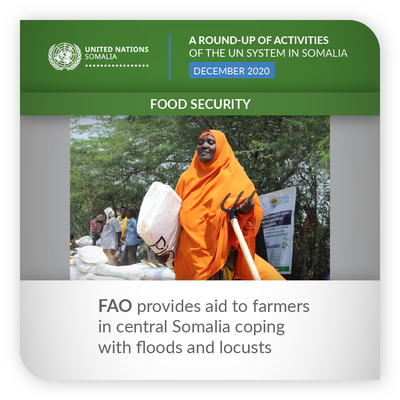 |
Food Security | FAO provides aid to farmers in central Somalia coping with floods and locusts With the financial support of the Bill and Melinda Gates Foundation, FAO was able to provide agricultural inputs (cowpea, sorghum and vegetable seeds, basic tools, and hermetic storage bags) to 5,750 agropastoral farmers and their families in the desert locust-affected areas in the Baidoa district of the Bay region in South West State. Furthermore, an additional 2,650 households in the Kuurtunwarey and Burloburto districts received complimentary fertilizer. Also, around 2,500 households in the Belet Weyne district of HirShabelle state received cash support to help them survive the desert locust invasion. In addition, seeds and tools were provided to improve the sustainability of their farming in the long-term. The vast majority of the Somali population depends on agriculture for their livelihoods. Many farming and herding communities rely heavily on rain-fed production systems, with the timing, duration and quantity of rainfall playing a critical role in rangeland rejuvenation and crop production. However, threats such as the desert locust pest create losses of up to 100 per cent for both crops and fodder, with devastating impacts on food security, livelihoods and the economy. http://www.fao.org/emergencies/fao-in-action/stories/stories-detail/en/c/1364953 |
|
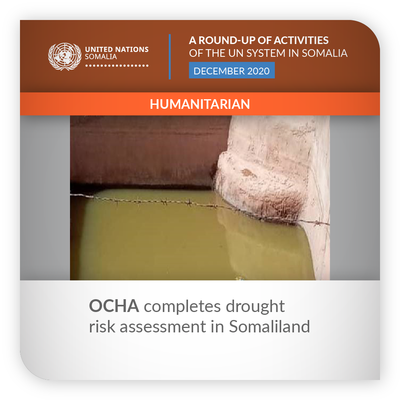 |
Humanitarian | OCHA completes drought risk assessment in Somaliland OCHA completed a drought risk assessment in Somaliland and has shared a draft report with partners for their feedback. The UN agency noted the existence of pre-drought conditions, including depleted water in berkeds (water catchments) and shallow wells, and a loss of pasture. Some 50 per cent of the assessed communities reported displacement of population related to water shortages, which has been taking place since October. An estimated 17,700 people in 20 assessed locations have been displaced due to poor Deyr rain in the past two to three months. |
|
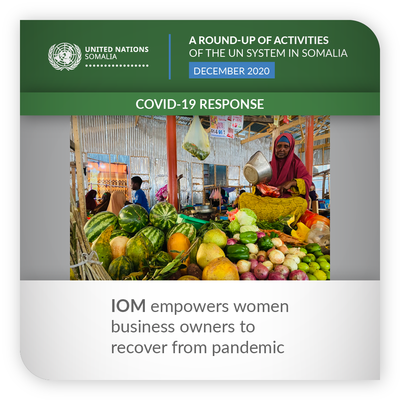 |
COVID-19 Response | IOM empowers women business owners to recover from pandemic Women-owned businesses in Somalia have been especially hard-hit by the COVID-19 pandemic, with disruptions in supply chains, the flow of customers, and reductions of cashflow. IOM, in partnership with Somalia’s Ministry of Labor and Social Affairs, supported 185 women-led micro- and small-enterprises (MSEs) to deal with the financial impact that COVID-19 has had on their businesses in the capital, Mogadishu. The support included cash grants and five days of training in business continuity, including basic financial literacy. Most of the women receiving this support are vulnerable to a range of factors. They include: having a high number of dependents, living in rented places or informal settlements, being displaced, having members of the family with disabilities, being unable to write or read, or having children at risk of child labour. IOM’s support is aimed at helping address these most urgent needs and at empowering them to be agents of change in their communities and an inspiration for future generations. https://www.iom.int/news/iom-empowers-women-business-owners-somalia-recover-covid-19-impact |
|
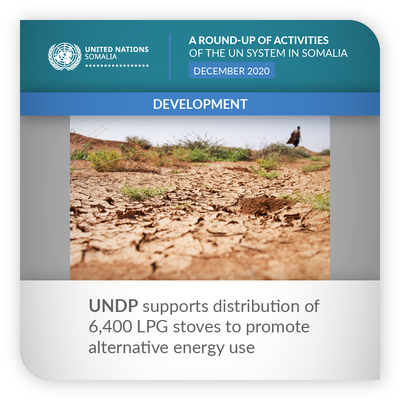 |
Development | UNDP supports distribution of 6,400 LPG stoves to promote alternative energy use UNDP supported federal and state governments and local businesses with the provision of LPG stoves to 6,400 families across Somalia. Gas cooking reduces deaths from indoor pollution and means that fewer trees are cut down for charcoal. Also, the gas systems can also be refilled by local businesses, boosting the economy. |
|
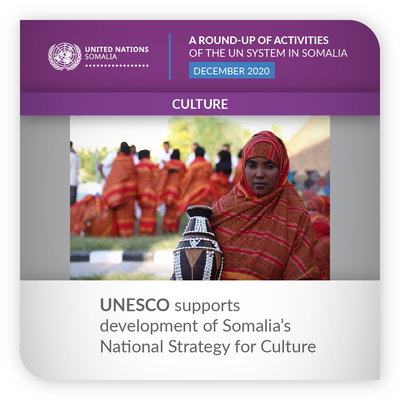 |
Culture | UNESCO supports development of Somalia’s National Strategy for Culture UNESCO recently mobilized international experts in various fields of competence to offer guidance, best practices and examples from Africa and around the globe in the development of Somalia’s National Strategy for Culture. Joining forces with the Somalia Academy of Science and Arts (SOMASA), and in collaboration with the Somali National Commission for UNESCO and the Somali Permanent Delegation to UNESCO, the UN cultural agency organized a national consultation meeting – with national and international experts, and other key stakeholders in the Horn of Africa country’s culture sector – to develop a National Strategic Plan for the safeguarding and promotion of its tangible and intangible cultural heritage. https://en.unesco.org/news/somalia-develops-national-strategy-culture |
|
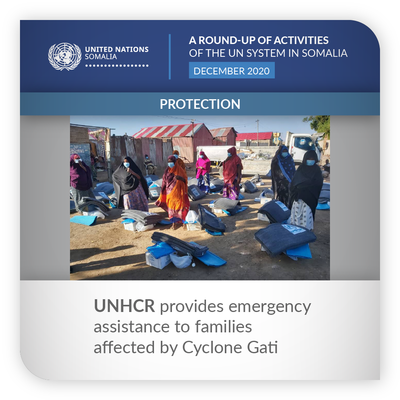 |
Protection | UNHCR provides emergency assistance following Cyclone Gati UNHCR airlifted humanitarian assistance from its warehouses in Mogadishu to Bosaso to aid thousands of people affected by Cyclone Gati following an appeal by the Puntland regional government. Gati – one of the strongest cyclones to affect Somalia in decades – impacted more than 180,000 people and forced an estimated 42,000 people from their homes after it made landfall in late November in Puntland’s Bari region. In December, UNHCR commenced the distribution of cash grants and relief items, including mosquito nets, solar lamps, jerry cans, soap, blankets, sleeping mats, kitchen sets and plastic sheets and/or cash transfers for emergency shelter. At least 36,000 individuals – including internally displaced people, refugees and the local host communities – received the assistance. |
|
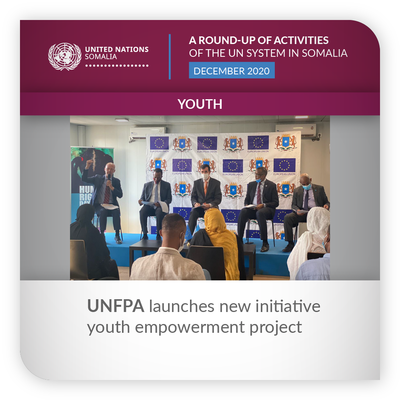 |
Youth | UNFPA launches new initiative youth empowerment project With financial backing from the European Union, UNFPA kicked off a new project – named the Dalbile Youth Initiative – to empower Somali youth. In support of the Federal Government of Somalia, the project is aimed at contributing to stability in Somalia by extending state authority and services, promoting local reconciliation and peacebuilding, creating inclusive economic opportunities and protecting the most vulnerable youth socially and economically. The European Union provided six million euros for the project, which UNFPA will implement with local partners Irise and Shaqadoon. |
|
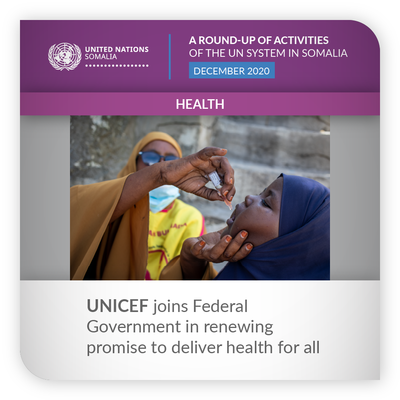 |
Health | UNICEF joins Federal Government in renewing promise to deliver health for all Marking Universal Health Coverage Day, observed on 12 December, UNICEF, UNFPA and WHO joined the Federal Government of Somalia (FGS) to renew their commitment to accelerate efforts to provide universal health coverage, and urged other health and development partners to do the same. According to UNICEF, universal health coverage ensures Somalis everywhere, no matter where they live, have equitable access to quality health services they need, without suffering financial hardship. It will strengthen health systems so that people can access vital health services even amid health emergencies, such as the ongoing COVID-19 pandemic, and will enable Somalis to access health services based on their needs, not on their ability to pay. The FGS has taken some concrete steps to roll out universal health coverage, in collaboration with UN agencies and health partners. These include developing a roadmap to advance universal health coverage, and continuing to address health emergencies and promote healthier populations. |
|
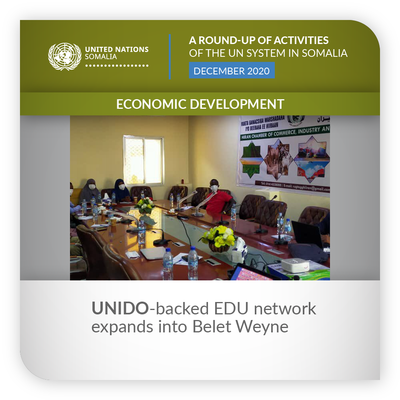 |
Economic Development | UNIDO-backed EDU network expands into Belet Weyne Somalia’s network of UNIDO-backed Enterprise Development Units (EDUs) is expanding with a new one being set up in the city of Belet Weyne in HirShabelle state. Funded by the Government of Italy, in cooperation with Somalia’s federal Ministry of Commerce of Industry and the Somali Chamber of Commerce and Industry, the Belet Weyne unit will provide entrepreneurship development training, business counseling and investment promotion support to local the businesses. The aim is to help them accelerate their ideas into business ventures and upgrade the potential of existing businesses to expand by providing access to enhanced business skills, new technologies, markets, and UNIDO’s financing facilities. This will be the fourth EDU in Somalia, following on from units established in Mogadishu, Baidoa and Kismayo. |
|
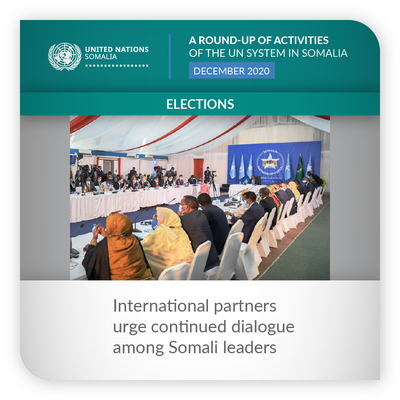 |
Elections | International partners urge continued dialogue among Somali leaders UNSOM was one of 23 of Somalia’s international partners which issued a joint statement expressing deep concern about ongoing disagreements over the implementation of the 2020/21 electoral process, and calling for further discussion and agreement on how the 30 per cent women’s quota in committees, amongst delegates, and for seats will be assured. The statement added that these disagreements need to be resolved in a manner that respects the 17 September political agreement and the implementation protocols signed by the Federal and Federal Member State (FMS) leaders on 1 October. The partners stressed that regular meetings of the Federal and FMS leaders throughout the electoral process and continuation of the Dhusamareb spirit of compromise will help keep the electoral process on track. |
|
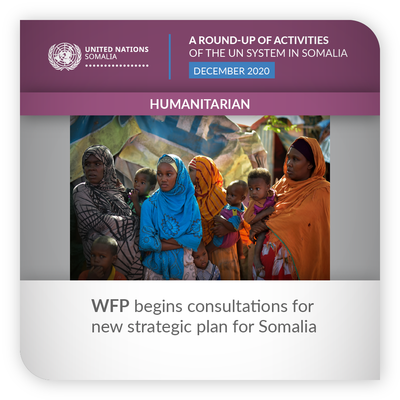 |
Humanitarian | WFP begins consultations for new strategic plan for Somalia WFP has begun engaging in intensive, government-led consultations with key line ministries, representatives of vulnerable and marginalized groups, community leaders, NGO partners, fellow UN agencies and other stakeholders on a new country strategic plan (CSP) that will guide WFP’s humanitarian and development work from 2022-2025. These consultations are an essential component of the CSP process – they reflect WFP’s strong commitment to working with and in support of Somalia’s national institutions, and to aligning with national development planning along with key frameworks for collaboration between government, UN agencies and others. |
|
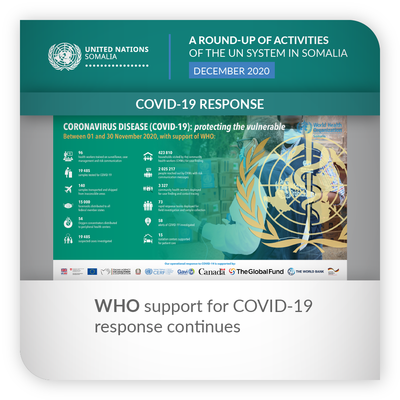 |
COVID-19 Response | WHO support for COVID-19 response continues Since the onset of the COVID-19 pandemic in Somalia, WHO has been supporting the Federal Government with its response to the virus. The key areas of support include response coordination, surveillance, laboratory, and case management. In the month of November, 96 health workers were trained and 3,327 community health workers (CHW) were deployed in 51 districts to continue with house to house visits, active case search and awareness-raising activities. The CHWs visited 423,810 households in November, and, in addition, 54 oxygen concentrators and 15,000 face masks were distributed. WHO’s efforts were supported by UK AID, the European Union, the Italian Agency for Development Cooperation, the UN Central Emergency Response Fund, Gavi, Canada, The Global Fund and The World Bank. |
|
|
|
 UN
UN
